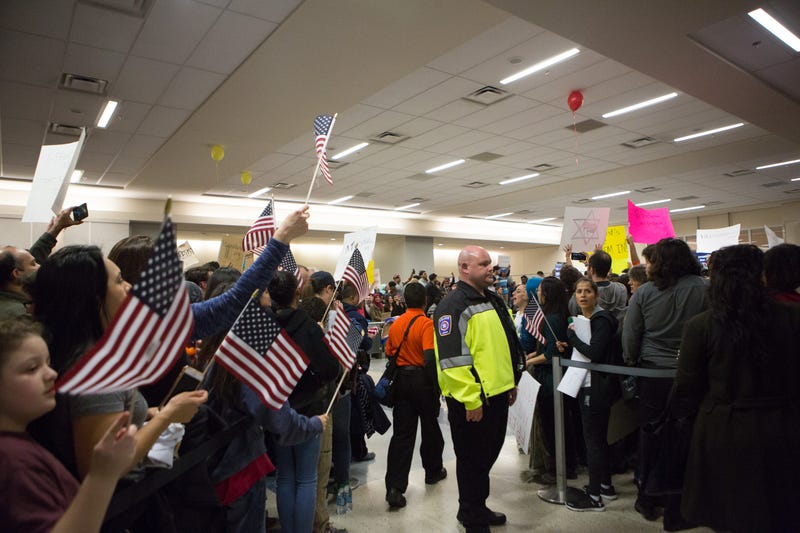
On Friday night, Donald Trump signed an executive order arbitrarily banning arrivals from a swath of majority-Muslim countries, to cataclysmic effect. The heroic lawyers at the ACLU and elsewhere worked long into the night to grant those detained a temporary stay, but dozens of people remain trapped at airports around the country.
Advertisement
Since then, hundreds of people have packed those airports in protest, and lawyers continue to tirelessly strategize the release of dozens of lawful residents and visitors being illegally held. Make no mistake—once the clouds of panic and confusion begin to settle, it’s almost certain that Trump’s executive order will be ruled in clear violation of the Immigration and Nationality Act of 1965, which explicitly says that no person can be “discriminated against in the issuance of an immigrant visa because of the person’s race, sex, nationality, place of birth or place of residence.”
Ann Donnelly, the U.S. District Court judge who issued the first temporary stay of enforcement of Trump’s order, wrote in her decision that those detained have “a strong likelihood of success in establishing that the removal of the petitioner…violates their rights to Due Process and Equal Protection guaranteed by the United States Constitution.”
Advertisement
In light of these facts, it’s incumbent on employees—the police, customs and border protection agents, ICE officers, and everyone else with a hands-on role in carrying out Trump’s order—to resist. Simply don’t do it.
It’s an extraordinary ask, and not everyone is in a position to potentially lose a job for their morals. (There are more surreptitious methods of refusal, like that employed by one airline employee who told the Guardian they’re just looking the other way: “We’re turning a blind eye—we’re pretending we haven’t seen the Syrian passport.”) But these are extraordinary times, and you don’t have to do it alone.
Ian Samuel, a lecturer at Harvard Law, points out that under Prohibited Personnel Practices of the U.S Merit Systems Protection Board, the law states that it’s prohibited for covered employees to “take or fail to take, or threaten to take or fail to take, any personnel action against any employee” … “for refusing to obey an order that would require the individual to violate a law.”
Sponsored
Samuel publicly offered on Twitter to represent for free any government workers who refuse to participate in carrying out Trump’s (illegal) mandate. He told Jezebel that already he’s received calls from workers weighing the possibility of defying orders to do what’s right. Samuel declined to go into details in order to protect the identities of his clients, including their positions and how many had contacted him, but said there were “several.”
“Policies don’t execute themselves by magic. They actually have to be carried out by people,” he said. “This travel ban…is not just horrific and unwise, but it’s illegal. It’s requiring the people who execute it to break the law.” If you’re a government official, whether you work in customs and border control or ICE etc., and you’re being asked to something that violates the law, he said, just don’t.
Advertisement
Advertisement
“If people just refuse to do these things, then they just wouldn’t get done,” he said. “We don’t have to do this. No one can make you go along with this.”
Samuel is joined by several other attorneys offering pro bono services. He’s still working on compiling a comprehensive list of the many who have offered (which will be added to this post when available). Until then:
- Daniel Epps is an associate law professor at Washington University. You can reach him at (314) 935-3532, or at epps@wustl.edu.
- Leah Litman is an assistant law professor at UC Irvine. You can reach her at (949) 824-9941, or at llitman@law.uci.edu.
- And Ian Samuel is a lecturer at Harvard Law. You can reach him at 917-803-8609, or at isamuel@law.harvard.edu.
None of Trump’s actions are possible without complicity from those beneath him—which, unfortunately, is everyone. The atrocities of Nazi Germany were carried out not by Hitler himself—a relatively puny man who certainly couldn’t have extinguished 11 million lives alone—but by low-level government bureaucrats who were merely doing their jobs. In covering the 1963 trial of the prominent Nazi operative Adolf Eichmann, Hannah Arendt famously wrote of the “banality of evil,” describing the monster she saw on the stand not as a monster at all, but an ordinary looking dude:
Advertisement
“The trouble with Eichmann was precisely that so many were like him, and that the many were neither perverted nor sadistic, that they were, and still are, terribly and terrifyingly normal. From the viewpoint of our legal institutions and of our moral standards of judgment, this normality was much more terrifying than all the atrocities put together.”
Arendt was later criticized for selecting the wrong example for her illustration of apparent normalcy, but the overall thesis remains the same. To those in a position to help, or to disobey, remember that history traditionally hasn’t looked too kindly on those who said they were only following orders.
Last February, former CIA director Michael Hayden made waves when he signaled that the U.S. military would likely disobey any ludicrous directive to assassinate the families of terrorists. “I would be incredibly concerned if a President Trump governed in a way that was consistent with the language that candidate Trump expressed during the campaign,” he said at the time.
Advertisement
Advertisement
It seemed absurd, back then, that the military would refuse orders from its Commander-in-Chief. But that seems like lifetime ago, and everything is different now. Trump cannot execute his order without the help of his constituents.
“Part of the reason I wrote this was to to say to people, you have a choice in this,” Samuel said. “And not only do you have a choice, but there’s a lot of people who have your backs for one of those choices.”













